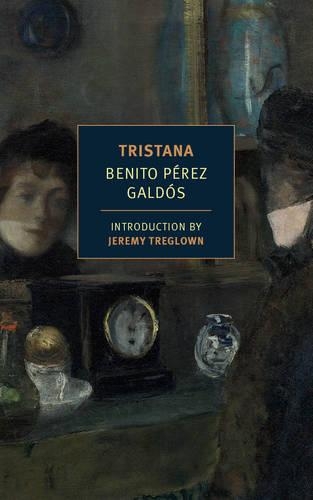
Tristana
(Paperback, Main)
Publishing Details
Tristana
By (Author) Benito Perez Galdos
New York Review Books
NYRB Classics
15th December 2014
20th November 2014
Main
United States
Classifications
General
Fiction
863.5
Physical Properties
Paperback
192
Width 10mm, Height 204mm, Spine 128mm
202g
Description
Don Lope is a Don Juan, an aging but still effective predator on the opposite sex. He is also charming and generous, unhesitatingly contributing the better part of his fortune to pay off a friend's debts, kindly assuming responsibility for the friend's orphaned daughter, lovely Tristana. Don Lope takes her into his house and before long he takes her to bed. It's an arrangement that Tristana accepts more or less unquestioningly- that is, until she meets the handsome young painter Horacio. Then she actively rebels, sets out to educate herself, reveals tremendous talents, and soon surpasses her lover in her open defiance of convention. One thing is for sure: Tristana will be her own woman. And when it counts Don Lope will be there for her. Benito Perez Galdos, one of the most sophisticated and delightful of the great European novelists, was a clear-eyed, compassionate, and not-a-little amused observer of the confusions, delusions, misrepresentations, and perversions of the mind and heart. He is the unsurpassed chronicler of the reality show called real life.
Reviews
[Perez Galdos's] prophetic gift for singling out those issues that were bound to transcend and outlast his own milieu was equaled only by his knack for keeping them controversial and alive in his fiction by refusing to take a clear-cut position on them. Hispanic Review Galdos immersed himself in the realities of his day and recorded them accurately. Symposium Magazine Tristana is a peach. An utterly delicious novel, even better than the Bunuel film. -- Phillip Lopate Galdos was the great novelist of Madrid, chronicling bourgeois, urban manners with a clarity and understanding critics have found comparable to that of Dickens, Balzac and Flaubert. -- Raymund A. Paredes Los Angeles Times Perez Galdos is one of the treasures of 19th-century Spanish fiction. -- The New York Times William Ferguson "[Perez Galdos's] prophetic gift for singling out those issues that were bound to transcend and outlast his own milieu was equaled only by his knack for keeping them controversial and alive in his fiction by refusing to take a clear-cut position on them." Hispanic Review "Galdos immersed himself in the realities of his day and recorded them accurately." Symposium Magazine
Author Bio
BENITA PEREZ GALDOS (1843-1920) was born into a middle-class family in Las Palmas in the Canary Islands. When he was nineteen, he was sent to Madrid to study law. Once there, however, he neglected his studies and plunged into the ordinary life of the capital, an experience that both developed his social and political conscience and confirmed him in his vocation as a writer. He became an assiduous theater- and concert-goer and a visitor to galleries and museums, and began publishing articles on literature, art, music, and politics. Galdos was the first to translate The Pickwick Papers into Spanish, and on a visit to Paris, discovered the works of Balzac. His first novel, La fontana de oro, was published privately and initially met with little interest. It wasn't long, though, before critics were hailing it as a new beginning for the Spanish novel. In a career that spanned more than forty years, Galdos wrote nearly eighty novels and some twenty plays. He also managed to find time to travel widely, in Spain and abroad, and to conduct a series of discreet affairs-one of them with fellow novelist Emilia Pardo Bazan. Perhaps his most ambitious literary project, entitled Episodios nacionales, comprised forty-six books, each chronicling a different episode in Spanish history from the Battle of Trafalgar onward. He continued to write until his death at the age of seventy-six, dictating his novels to an amanuensis when blindness overtook him. Galdos provides his readers with an extraordinarily vivid picture of life in nineteenth-century Spain; his novels teem with fascinating characters from all social classes. His masterpiece is generally considered to be the vast and wonderful Fortunata and Jacinta, but equally impressive are such works as Dona Perfecta, Misericordia, La de Bringas, and Miau. Luis Bunuel based three of his movies-Viridiana, Nazarin, and Tristana-on three Galdos novels, perhaps recognizing in Galdos a fellow subversive. MARGARET JULL COSTA has been a translator of Spanish and Portuguese literature for nearly thirty years. Among the authors she has translated are Jose Saramago, Javier Marias, and Eca de Queiroz. She has won many prizes, including the PEN Translation Prize. In 2013 she was invited to become a Fellow of the Royal Society of Literature, and in 2014 she was awarded an OBE for her services to literature. She lives in the United Kingdom. JEREMY TREGLOWN is a writer and literary critic known most recently for his work on Spanish culture, film, and literature. His books include several biographies, including V. S. Pritchett, which was short-listed for the Whitbread Award for Biography, and most recently Franco's Crypt: Spanish Culture and Memory Since 1936. He was the editor of The Times Literary Supplement for almost a decade and is currently the Donald C. Gallup Fellow in American Literature at the Beinecke Library at Yale. He lives in the United Kingdom.
